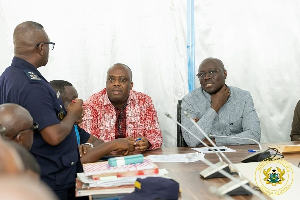Diverse public view have been expressed about the 40 percent increase in the transport fares jointly announced on Tuesday by the Ministries of Road and Transport and Energy and the Ghana Road Transport Co-ordinating Council (GRTCC).
While a section, mostly commuters were of the view that the new fares were too high, drivers and their mates, on the other hand complained of being cheated. The “Times” gathered these views in random interviews in Accra yesterday.
John Teye Mensah a National Service Person at the Korle-Bu Teaching Hospital commended the government for the new rate saying that it would ensure peace between driver and passengers.
He noted however that despite the official 40 percent increase some drivers were still charging higher. He said that even though the government was justified to increase the prices of petroleum products, the near 100 per cent increases were inappropriate. He wondered how worker would survive the impact in view of the salary levels.
Jacob Korley, a carpenter, said that the review had created problems for the low income group as any increase in the price of petroleum products automatically affects other commodities and services.
A driver, Tetteh Quaye, called for an upward review of the 40 percent increase to avoid tension between drivers and their vehicle owners. He expressed concern about the reduction in the number of passengers for Urvan buses.
He feared that if nothing was done about the situation, most vehicles would be off the roads. An unemployed graduate, Frederick Hesse, welcome the increases in the prices of petroleum prices but was of the view that the timing was bad.
He called on the Ghana Private Road Transport Union (GPRTU) and the police to collaborate to ensure strict compliance with the new fare.
Kofi Aboagye, a driver, said the 40 per cent increase favoured passenger and long distance drivers and not short distance drivers. According to him, the prices of spare-parts had also increased drastically and wondered how they could meet the daily sales for their vehicle owners.
Jafaru Yakubu, a Nima-Lapaz “tro tro” driver, said the new fare did not favour them because they operate at a loss. He explained that with the increase in the price of petroleum products, the price of spare parts had also shot up, so the 40 per cent increase in fare is inappropriate.
Yakubu said the appropriate increase in fares should have been between 70 and 75 per cent. A passenger by name Ibrahim said, although the fares were too much since they paid high for fuel.
Foster Appiah of the Circle-TUC taxi rank said he could not make his daily sales for three days because he spent a lot more on buying petrol than he earned. He said that he experimented with a gallon of petrol and ended up getting only 17,000 cedis.
Peter Badu of the Odawna “tro tro” station, said although they were asked to take 800 cedis, they were demanding 1000 cedis. He argued that with the reduction in number of seats coupled with the increase in the price of petroleum products, they would be out of business if they charged the stipulated 800 cedis.
Madam Grace Akuffo, a passenger and resident of Israel, said “tro tro” drivers plying the Israel-Circle route had refused to charge the new fares.












